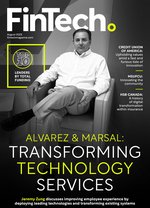Asset Tokenisation: $5tn opportunity or financial calamity?

The reach of blockchain technology has long been touted as something that goes far beyond crypto, and after Mastercard recently explored asset tokenisation, the future of blockchain’s extended role in financial services may be closer than currently envisaged.
Below, we get the thoughts of Ralf Kubli, board member for the Casper Association on whether asset tokenisation does or does not represent an opportunity for financial service providers.
Kubli on blockchain's evolution
Mastercard's recent foray into asset tokenisation is a major step forward in how blockchain technology is being adopted and evolved. The launch of Mastercard's testbed in the UK, known as the Multi-Token Network (MTN), demonstrates a serious effort to explore the potential of tokenised bank deposits. The goal is to create a secure, efficient, and decentralised way of transferring value.
While this represents a positive step forward for the emerging digital economy, it’s just the tip of the iceberg of the vast and untapped potential of asset tokenisation. According to global asset management firm Bernstein, the tokenisation markets could be on track to reach a staggering US$5tn over the next five years, making one thing abundantly clear: the future of finance is heading more towards digitalisation.
However, to avoid repeating the mistakes of our financial past, we must be willing to scrutinise current practices of tokenisation. The true potential of tokenisation lies beyond digitising individual assets alone, which is often overlooked; it’s integral to ensure tokenisation and standardisation of cash flows and liabilities, as well as the asset.
Kubli on the importance of comprehensive standardisation
The current limitation of most tokenisation platforms is that they only digitise the asset but not the underlying liabilities or cash flows. Often, this amounts to a digital representation of an asset with an encrypted hash of a PDF of the terms and conditions. This PDF is not machine-readable or executable; a human must still access and interpret it before the liabilities and cash flows can be calculated.
Take a tokenised asset that represents ownership of a house, for example. The token may be on the blockchain, but the cash flows associated with the house, such as mortgage repayments, are still calculated in many disparate systems leading to reconciliation problems. This represents a veneer of innovation. Yes, the asset can be transferred more efficiently, but this means very little if the underlying cash flows still need to be assessed by a human intermediary. It also introduces a risk that the cash flows could be miscalculated or result in discrepancies between the cash flows represented on the blockchain and the actual cash flows.
However, by focusing on the cash flow obligations and ensuring they are also tokenised, machine-readable, and machine-executable, we can ensure that this emerging technology not only improves existing systems but also avoids the lack of transparency and verifiability that led to the 2008 financial crisis.
To do this, we need smart financial contracts — self-executing contracts stored on the blockchain. They can automate financial transactions, making them more transparent, secure, and efficient.
For example, if you want to buy a bond from a bank, the bank would create a smart financial contract specifying the bond terms, such as the interest rate, maturity date, and face value. When you buy the bond, the smart financial contract will automatically execute and transfer the bond to your account.
This process is much more efficient and secure than the traditional way of buying bonds which involve manually processing paperwork and sending money through a clearinghouse.
Smart financial contracts can make financial transactions smoother and reduce the risk of human errors by making the terms of an agreement machine-readable and machine-executable.
Implementing open banking standards into current tokenisation practices and standardising smart financial contracts can create an ecosystem where cash flows are machine-readable and executable at an algorithmic level — making financial instruments more transparent, verifiable, and continuously auditable.
Kubli on ACTUS: a framework for financial ecosystem integration
Smart financial contracts in tokenisation are being standardised by the ACTUS (Algorithmic Contract Types Unified Standards) initiative. It provides a robust framework for stakeholders like banks, regulators, accounting firms, and tech companies to monitor and analyse financial stability, improve financial reporting, and identify precise terminology, algorithms, and data models that depict cash flow patterns.
This type of framework develops an intelligent, machine-readable, and machine-executable algorithmic representation of financial agreements. It depicts related cash flows and the current state of various risk factors, such as market risk, counterparty risk, and behavioral risk, and establishes a clear limit for these risk elements' future states.
Standardisation enables the seamless integration of smart financial contracts into existing banking and economic systems. For financial ecosystem communication and interoperability, it aims to create a universal language and taxonomy for financial contracts.
These definitions must be extensive and interoperable for tokenisation to flourish and have a meaningful impact on the financial world. It should cover a wide range of financial instruments and detail the terms, conditions, and parameters of each contract type; This level of definition and standardisation will enable asset tokenisation's full potential by ensuring consistency and smooth operation in the tokenised ecosystem.
Kubli on global progress in tokenisation
The world is moving towards a digitised and decentralised financial landscape, with major institutions, such as the Bank for International Settlements (BIS), proposing an innovative approach that fuses Central Bank Digital Currencies (CBDCs), tokenised deposits and assets on a programmable platform. Such initiatives from key institutional bodies can only help to bring to bear the full benefits of tokenisation.
The bottom line is that blockchain may be the most important new technology for finance since the introduction of the computer decades ago. This isn’t just about making markets more efficient; it’s also about addressing problems in the banking world that are still risking global stability. It’s time for financial leaders to pay attention.
The road ahead may be challenging, but with industry-wide collaboration, a clear strategic vision, and a steadfast commitment to smart financial contract standardisation, we can catalyse the tokenisation revolution.
This will transcend its current limitations and deliver on its promise to reshape finance for the better.
About the Ralf Kubli
Ralf Kubli is a board member at the Casper Association and an experienced executive with a strong background in blockchain, cryptocurrencies, and decentralized technology. Ralf holds an MBA from Cornell and an MA in History from the University of Zurich.


